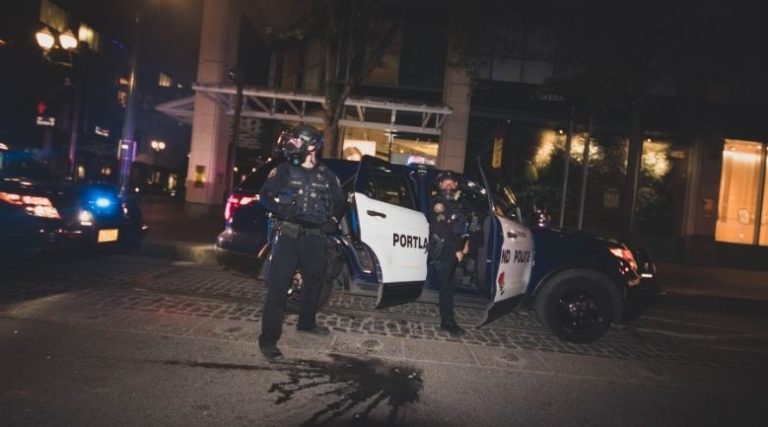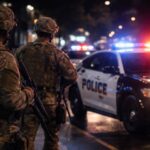Since last year, state and local lawmakers have sought ways to restrict police officer’s rights and capabilities in the name of “social justice.” These policies have ranged from ending, or greatly diminishing, police officer protections from superfluous investigations, civil liabilities from actions taken on the line of duty, and to taking away effective use of force tactics when needed. The death of George Floyd last year provided cover for the government to attempt usurping complete control over independent law enforcement and to enact policies which have eroded police morale and effectiveness.
Below are five bills in states across the country which make the jobs of police officers in America more dangerous and less effective:
AB-48, California
In the Orwellian world of Leftist politics, rioters who burned, looted, and killed across America last year were heralded as peaceful protestors raging against the injustices of the American legal system. As courthouses were attacked, police assaulted, and entire cities overrun, political hacks and their media allies painted the anarchists as heroes. Now, in a recent bill, the state of California would like to be sure police officers and the communities they serve are virtually defenseless in these scenarios. AB-48, which has passed the California Senate, would “restrict the use of rubber bullets and chemical irritants during protests,” according to KTLA 5. Should this bill pass the state House, which it likely will, police in California will be severely limited in their responses whenever the next politically motivated protests in the state inevitably turn violent.
SB 148, Delaware

A common theme in many police reform bills in state & local governments across America is the injection of a “reasonable” clause. In short, these clauses use theory instead of reality to determine whether a police officer’s use of force was appropriate in a given situation. Delaware’s SB 148 now enshrines this standard into state law. In a statement, State Rep., Sherry Dorsey Walker said, “Increasing the Division of Civil Rights and Public Trust’s role in use-of-force incidents and applying the ‘reasonable’ standard will greatly improve accountability in situations where an officer uses force.” But what does this really mean? As noted by WHYY.org, this standard is set as “a belief that is reasonable from the viewpoint of a reasonable law enforcement officer in the defendant’s situation under the circumstances.” These standards are simply rhetoric and allow the investigations of police conduct to become political. When one’s life is on the line, who is to determine what is reasonable in the abstract? A government body? A citizen review board? Activist groups? This bill, and others like it, completely disregard the do or die reality many officers are faced with when responding to calls where anything can happen.
House Bill 670, Maryland
In 1974, the state of Maryland became the first in the country to enshrine a “Police Bill of Rights.” This landmark bill afforded police officers extra shielding from civil liabilities from actions taken in the line of duty. In 2021, they also became the first in the nation to revoke this “Bill of Rights.” As noted by Fox News, the “Maryland Police Accountability Act of 2021,” ends due process protections for police officers and “…increases the civil liability limit for officers from $400,000 to $890,000 and an officer convicted of using excessive force, causing serious injury or death could face 10 years in prison. It also sets a new statewide standard for what is deemed “necessary” force.” Republican Governor, Larry Hogan, issued three vetoes against the bill, which were all overridden by the Democrat controlled state legislature. In a statement, Hogan said “The basic due process protections to which police are entitled have been removed. … Our police and our citizens deserve far better. The extreme flaws in this bill leave me no alternative but to veto this bill.”
House Bills 1054 & 1310, Washington
The state of Washington has been a hotbed of anti-police policies and anarchist lawlessness since the summer of 2020, when the mayor of Seattle, Jenny Durkin, allowed large swathes of Seattle to be overrun by ANTIFA and turned into “occupied” zones. Now the state’s legislators have done their best to ensure police have their hands tied behind their backs through new legislation. House Bill 1054 “appears to significantly reimagine police tactics by strongly restricting the use of tear gas, the use of neck restraints in apprehension, and various other police tactics and tools that some critics say undermine police officers’ ability to prevent violence from escalating,” according to 770 KTTH talk radio. In addition, House Bill 1310 sets standards for physical force which some critics argue prevents officers from restraining those experiencing mental health emergencies. Both bills move to give the state further control over how police officers can do their jobs and expose them to potentially dangerous encounters leaving them to choose between personal safety and professional security.
More Than 250 Police Officers Made the Ultimate Sacrifice in 2020… According to the National Law Enforcement Officers Memorial Fund (NLEOMF), 264 federal, state, military, tribal, and local law enforcement officers were killed in the line of duty in 2020 — an increase of 96% from 2019 and the highest number since 1974.
Image Credit: Photo by Tito Texidor on Unsplash








